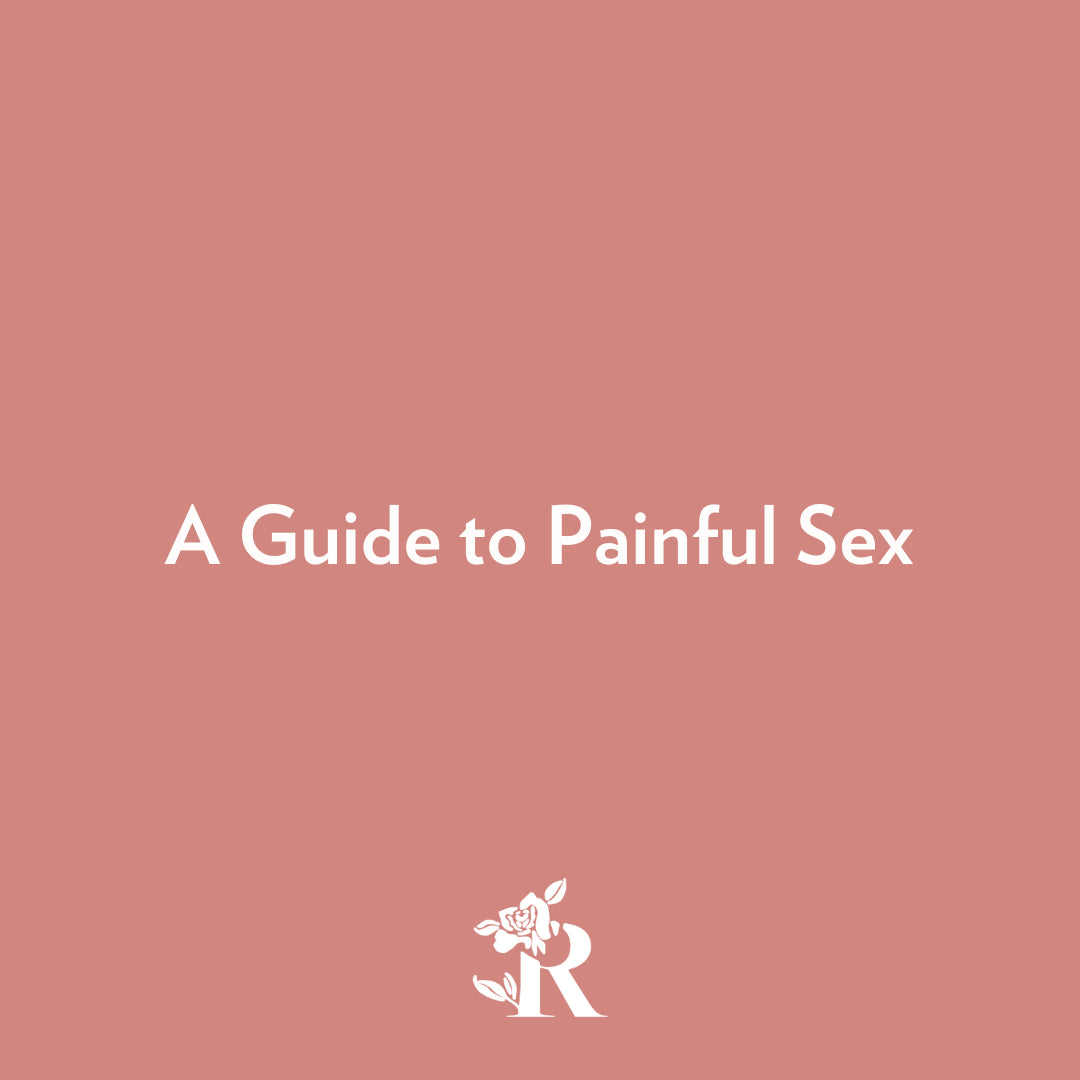A Guide to Painful Sex
A Guide to Painful Sex
Most women will experience painful sex at some point in their lives. While this isn’t a statistic women are eager to hear, it means you are not alone if you’ve experienced painful sex - especially if you are, or have been through menopause. Between 17% and 45% of postmenopausal women report that they have experienced painful sex. If you are experiencing pain during sex there are ways to avoid it.
What is Perimenopause?
Perimenopause directly translates to “around menopause”; it is the first stage of menopausal experience. This stage occurs on average between the ages of 38 and 44. It indicates that your body is starting to approach menopause. Symptoms of perimenopause include estrogen fluctuations and longer or shorter menstrual cycles. You may also experience hot flashes or difficulty sleeping, much like menopause. Perimenopause is nothing to be concerned about, and it’s completely normal to experience it in your late 30s or early 40s, so no need to freak out. The clearest indicator that you have moved from perimenopause to menopause or postmenopause is the lack of a menstrual cycle for 12 months. When you have not experienced a period for a year, you’ve officially entered menopause.
What is Menopause?
Menopause is not a disease or disorder. It is something that every woman experiences typically sometime in their early 50s. This is a transitional time for a woman’s body. Our bodies go through a change that results in no longer having a menstrual cycle. Some women find this transition liberating - not having to worry about getting pregnant, or dealing with painful cramps or bleeding. There are menopausal symptoms that women may experience to signal this transition is occurring.
Many women will experience hot flashes, as well as irregular menstrual cycles, as they start to transition into menopause. There are fluctuations in both estrogen and progesterone levels that also affect women’s moods and behaviors. Loss of bladder control is another symptom of menopause that many women experience during this time.
In addition to the symptoms above, it is extremely common for your vaginal health to fluctuate. You may experience vaginal dryness which can lead to pain during sexual intercourse.
What Causes Painful Sex?
Painful sex is anecdotally most common in postmenopausal women; however, anyone can experience pain during sex.
Painful sex is known as dyspareunia. This is defined as “persistent or recurrent genital pain that occurs just before, during or after sex.” It can feel like tightness or extreme pain in the vagina. Dryness, soreness, or burning of the vagina or vulva can result in pain.
Postmenopausal women often notice a difference in the natural lubrication that their vagina produces. When estrogen levels are consistent, vaginal/vulvar areas are well lubricated and the skin on the vagial walls is thicker. When estrogen levels start to fluctuate, there is a higher likelihood of dryness, which causes discomfort in the vaginal area - especially when it comes to sex.
In short, when you go through menopause, your vagina becomes tighter, less lubricated, and your vaginal walls become thinner. The lack of estrogen caused by menopause can also weaken your pelvic floor, which can lead to frequent UTIs, incontinence and pain during sex.
At Home Treatments
Painful sex caused by dryness can be treated with at home remedies:
- Take a warm bath: The warm bath water can help relax the vagina.
- Use a natural lubricant: Using a lubricant gives natural moisture to the vaginal area which inherently addresses dryness. When using lubricant, you can apply it before and during sexual intercourse. If you are using condoms be sure to use a water-based lubricant as oil-based lubricants can break down latex condoms.
- Use a vaginal moisturizer: Use a moisturizer that is specifically targeted towards vaginal dryness. Rosebud’s Honor Everyday Balm is specifically designed to help strengthen vaginal walls and moisturize the vagina and vulva to soothe discomfort. It also doubles as a lubricant!
- Focus on foreplay as opposed to penetration: Not only can foreplay help to make your vaginal area more ready for penetration, but it can be an enjoyable way for you and your partner to engage sexually with one another without the worry of pain.
- Masturbate: Masturbation is a great way to naturally moisturize your vagina. You can do this by yourself, or include a partner, but masturbation may help with production of moisture in your intimate area.
- Communicate with your intimate partner: The last thing your partner wants to do is be the source of pain - especially during an act that is supposed to be pleasurable. Communicate with your partner if you’re experiencing pain, and brainstorm ways together to make it more enjoyable.
Medical Treatments
When at home treatments don’t work for you, there are medical treatment options for painful sex as well:
- Topical Estrogen: This is a topical cream that is applied directly to your vaginal area - it will help to regulate your estrogen levels and restore some of your vaginal moisture.
- Osphena (ospemifene): The Food and Drug Association (FDA) approved this drug that acts as estrogen in the vaginal lining.
- Hormone Therapy: This treatment re-introduces healthy estrogen levels back into your body.
- Desensitization Therapy: Medical professionals may suggest vaginal relaxation exercises to decrease sensitivity in the vagina potentially leading to decreased pain.
- Counseling or Sex Therapy: If sex has been painful for a long time, you may have negative connotations with sex. Sex therapy can help you find pleasure that can be associated with sex.
When to See a Doctor
If, after you have tried the at home remedies and you are still experiencing persistent or extreme pain, it’s time to have a conversation with your OB/GYN. Another symptom that can indicate it’s time to talk to a doctor is bleeding during or after sex, especially when you are not experiencing your period anymore.
When you see a physician, you will likely receive a physical exam including a pelvic exam or Pap smear as well as a transvaginal ultrasound - this is performed in order for doctors to gain a better image of your reproductive system. If your doctor is concerned about infection or disease, you will also receive a blood test and they will collect a urine sample in order to give you the best treatment for your symptoms.
Your doctor is the best person to talk to about the pain or discomfort you’re experiencing. Even if you may feel a little bit awkward or uncomfortable having these conversations, it’s healthy to talk about and it is your doctor's job to assist you in whatever ways they can.
The Bottom Line
Menopause is a natural stage every woman experiences, but that doesn’t make it any more comfortable to go through. As frustrating as painful sex can be, there are ways to continue to find pleasure. Look into solutions as opposed to giving up on having sex. Once you find treatments that work for you, your enjoyable sex life can continue through your midlife and postmenopause.











